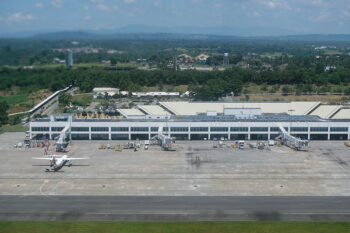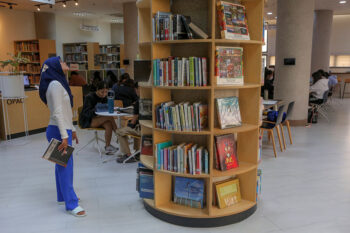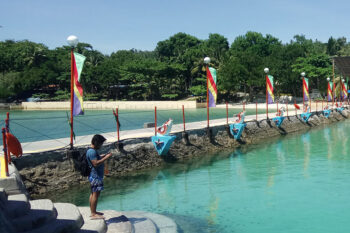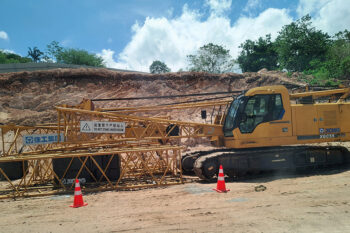DUNEDIN, New Zealand (MindaNews / 08 Sept) — Last month, President Rodrigo Duterte criticized the Ombudsman for “selective justice,” threatened an Iloilo mayor whom he accuses of shielding drug lords, and lashed out at government agencies hiring overpriced contractors. But it would be good for the President to look in the mirror at his own version of selective justice and the hiring and shielding of Omar “Solitario” Ali, a Maranao leader who was on the President’s own drug lord watch list. He was hired by the Office of the Presidential Adviser on the Peace Process (OPAPP) because, as a former Moro National Liberation Front commander and former mayor of Marawi city, he agreed to negotiate with the Maute group in the administration’s management, or should we say mismanagement, of the Marawi crisis.
“Marawi City has the unsavory reputation of being the lynchpin in Muslim Mindanao’s drug economy,” (p. 104) and is, “in the grip of narco-politicans” (p. 105) so states International Alert’s “Out of the Shadows: Violent Conflict and the Real Economy of Mindanao,” an in depth book of research on the various “shadow economies,” including the illegal drug trade of Mindanao published in 2013.
Drug trading reportedly worsened during the political dynasty of Solitario who was mayor of Marawi from 2001-2007, and reached a full blown crisis under his half brother Fahad “Pre” Salic’s term as mayor of Marawi mayor from 2007-2016. Additionally, according to the aforementioned study, “an official with direct access to military intelligence stated that narco-politicians from Lanao del Sur are conniving with the Kuratong Baleleng” (p. 105), the supposed drug syndicate of the Parojinog clan in Ozamiz, who were recently killed in an anti-drug raid by the Philippine National Police.
A Manila Bulletin report said Presidential Adviser on the Peace Process Jesus Dureza admitted that Ali [aka “Solitario”] had contacted him by phone “even before the Marawi (strife) erupted,” warning ‘about possible (violent) incidents involving the Mautes’ as conveyed by Salic [Solitario’s half brother, aka “Pre”], uncle by affinity to radical brothers Omar and Abdullah Maute”[i].
In this report, “Dureza…confirmed that he had taken in (Solitario) as an OPAPP consultant way before the Marawi siege erupted.”[ii] This happened sometime after the Davao bombing in September 2016, and not long after Solitario, Pre, and Arafats’ names had been included in President Duterte’s drug watch list released in early August of 2016.[iii]
In Lanao, the underlying family relations surrounding these events should be understood as much as possible. Pre and Solitario, half-brothers, have the same father, of the Salic clan, while Solitario’s mother is of the Ali clan of Marawi and Baloi, by which Solitario took the last name of “Ali” as a revolutionary nom de guerre and MNLF commander.
Butig
Solitario’s son and Pre’s nephew is Arafat Salic, Marawi’s Vice Mayor, who retains the last name of his grandfather, Solitario’s and Pre’s father. Though Pre’s maternal line is of a different sub-clan that connects with the clan of the Maute, Solitario and Pre, according to some, trace both their maternal and paternal lineages back to one of the orginal 11 Datuships of Marawi, that being the Guimba and Buadi Sacayo, thus giving them the strategic social status of sultans in Lanao. These lineage complexities are vitally important as they serve as avenues of political alliance, even social reconciliation, as well as unseen fault lines of conflict, and the means by which risks are minimized and the rewards from involvement in both legal and illicit economies are distributed.
Pre and his nephew Arafat were widely believed to be directly involved not only in the drug trade, but also in kidnap-for-ransom (KFR) /extortion in Lanao, with alleged Philippine military collusion. Additionally, at various times they allied with, and competed against, the Maute family whom the government accused of organizing the siege of Marawi, and was allegedly behind the September 2016 Davao City bombing.
In October-November 2016, the military responded to the Davao bombing by attacking Butig, Lanao del Sur, supposedly driving the Maute group out and securing the area. However, the government must have known that they had not succeeded in eradicating the threat, according to the Inquirer, because they hired Solitario as a consultant, working with his half-brother Pre, to negotiate with the Maute group in late November 2016, “soon after…government troops…had overrun the Maute group’s lairs in several villages in Butig town”[iv].
However, the government failed to woo the ISIS-affiliated Matue clan through negotiations even after this military success, an indicator more of political incompetence. As one local analyst noted, “political feud yan –a small war of political clans in Butig which escalated into full blown war.” Thus, in the lead up to the Marawi crisis, the government undrcut itself in its all out war against the Abu Sayaff in Sulu and military incursion into Butig, so that the same analyst noted that “while Jolo was bombarded and militarized, Abus moved in the mainland Mindanao and in Bohol. Hindi isang surprisa ang lahat. Nacomplicate lang lalo ang conflict nang pinasok ang gulo ng druga. (None of this was a surprise, it just became more complicated, esepcially with all the chaos caused by drugs).”
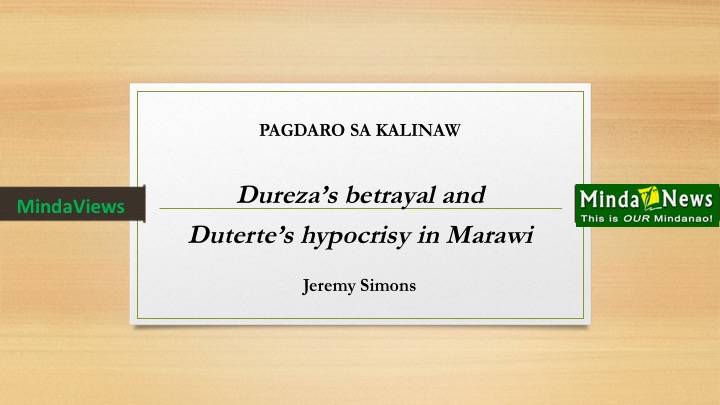
Complicated history
The complicated history of some of these clan politics illuminates the background to the violence in Lanao in the present. A local historian notes, “the leadership of Marawi City is hotly contested by two clan groups – the five Marawi Clans and the six Dansalan Clans. These clans belongs to the old Confederacy of the 11 clans of Marawi. The dividing line of the two groups is the Agus River.” These clan groups have been jockeying for influence in the areas around that dividing line since the American invasion in the late 1800s. The municipality was thus originally named “Dansalan” by the Americans, and only changed to “Marawi” in the 1950s when a politican from the Marawi group won the mayoralty.
Masked by the guise of the political developments of the Philippine state and the revolutionary movements of the Moro National Liberation Front (MNLF) and Moro Islamic Liberation Front (MILF), clan dynamics and affiliations remain fluid. At stake for the Maranao community in their hundred and twenty years of resisting, accommodation, and manipulating outsiders, is the political leverage needed to control access to the many resources of Lanao, initially timber, then the fertile agricultural land and aquatic resources of Lake Lanao, and more recently the production of shabu (methamphetamine) and other profits derived from shadow economies. Of equal, or perhaps greater importance, is the power to claim and assert Maranao cultural integrity, the defense of the family and clan, and honor of the people.
The key to this leverage rests at the pinnacle of political influence, which Solitario had achieved in a personal meeting with the President, assisted by Dureza, as mentioned in a Mindanews report, when Solitario “met with President Duterte early on and volunteered to help, I [Dureza] engaged him (in) OPAPP with a consultancy.” Later Dureza added, “At one time, when the President was in Cagayan de Oro monitoring Marawi, I arranged his phone call with the President. The President told him over the phone that he instead should talk to me. So I continued handling him.”[v]
In an Inquirer article, Solitario said the Maute negotiations were known at the presidential level, “(Solitario) told the Inquirer…that he took orders from Presidential Adviser on the Peace Process Jesus Dureza. ‘I am sure the President knew about my going to Butig.’”
Go ahead, do it
During Duterte’s speech to the Wallace Business forum in December 2016, the President also alluded to the demands and counter demands of the Maute-OPAPP negotiations that happened during and after Butig was overran. He said: “we took consideration of the Maute rebellion going on in Lanao. And they said that they are willing to pull out…And they demanded that we stop the offensive…and I said they would stop fighting, provided we stop the offensive or not, they said that they will go down upon Marawi to burn the place. And I said, ‘Go ahead, do it.’”
One of the economic drivers of this relationship is revealed in Duterte’s next comment at the Wallace forum, in response to the threat by Maute to “burn the place.” Duterte said: “We need to do a lot of constructions in this country. There are a lot of materials there and we will be glad to rebuild and rehabilitate every structure that you destroy. As long it’s confined in the areas of Lanao, I don’t really care.”
Thus, as we contemplate the reconstruction of Marawi, we see the rash overconfidence of a President willing to sacrifice the people and place of Lanao for the economic benefit of constuction contractors and the political safety of his Lanao political affiliates.
Duterte also needed to keep Solitario safe because he, as one of the premier recognized leader in the Marawi clans, was also a key player in the Lanao del Sur provincial PDP-Laban party of Duterte, that he ran under in the 2016 election. That was revealed in a text message sent in the last quarter of 2016 where Solitario told his partymates to withdraw their support for Duterte as he and his brother Pre were included in the drug watch list released by Duterte on August 7, 2016.
Thus, though Dureza was unable to remove Solitario or Pre’s name from the drug watch list, he made no attempt to bring in law enforcement, and the drug-accused former politican of Marawi worked for OPAPP for at least five more months (the Inquirer mentions his first direct OPAPP work happening in November), until the two lists of people with rebellion arrest warrants were released in late May and early June[vi] respectively, and Dureza was forced to revoke Solitario’s contract with OPAPP.
Dureza stated, according to the Manila Bulletin, that when Solitario’s name was included in the arrest orders pursuant to the declaration of martial law, “I revoked his consultancy arrangement with OPAPP….(He) stayed in a safe sanctuary outside the city but kept in touch making suggestions on how to deal with the developing incidents.”[vii]
How did Dureza stay in touch with a wanted man and where was this safe sanctuary?
Delisted, relisted
Another key player mentioned in newspaper reports of the Maute and Salic negotiations is the Quijano clan of Iligan, who benefits from their role as negotiators in resolving the many kidnappings that have occurred over the years in Northern Mindanao. Some believe that Solitario’s “safe sanctuary” was at one point the Phividec Industrial Authority in Misamis Oriental where Franklin Quijano was appointed administrator and CEO by President Duterte on July 14, 2017, at the recommendation of Dureza.
While Solitario had been welcomed into the “safe sanctuary” provided by his and Dureza’s long time political ally Quijano, Dureza made intensive efforts to clear Solitario’s name and remove him from the second list of people with warrants of arrest for rebellion, successfully getting his name removed from that list on August 16, 2017. According to Mindanews, Dureza then, “e-mailed the copies [of the clearances removing Solitario, Pre, and Arafat being subject to arrest warrant] to former iligan Mayor Franklin Quijano to pass them on to Omar Solitario”.[viii]
However, that decision was reversed just six days later on August 22 by Defense Secretary and Martial Law administrator Gen. Delfin Lorenzana, who stated, “It was Dureza who wants to utilize him kaya humingi siya ng clearance, only to find out that the military, police and Muslim leaders don’t want them released for complicity in the Marawi siege and illegal drugs.” Furthermore, Lorenzano stated, “I told him (Dureza)…. we are not stopping the gathering of info about (Solitario’s) alleged connection to the Mautes and illegal drugs”.[ix] After this reversal, Solitario apparently fled to Manila, where he would be “beyond the reach” of the martial law adminstrator.
The extent of the cozy relationship with Dureza and Solitario in kidnapping negotiations goes back even before the kidnapping of Comelec commissioner Elias Yusoph in 2010, where Dureza met with Solitario for lunch to help with negotiations, and in a Mindanews article declared, “I have been here for so long that I can weave in and out and go to various political leaders and parties in Mindanao.”[x]
A long time observer to the peace process notes that Solitario was one of Dureza’s (who was a congressman at the time) key partners in dealing with local kidnapping groups active during the Cory Aquino days. When Dureza worked for president Ramos as Mindanao advisor in the 1990s and later as peace negotiator for Arroyo whose administration spanned nearly a decade (2001 to 2010), Solitario was a key player in the peace process, having risen to the mayorship of Marawi city (2001 to 2007).
Meanwhile, Franklin became mayor of Iligan City (1998 to 2004) and his brother Robert “Bob” Quijano started a non-governmental organization in Iligan. They are described as “inseparable…Franklin is the open politician, [Bob] is the underground player who has the contacts with the various underground groups… But both of them are very committed to conflict resolution and are known to be involved in facilitating the release of kidnap victims.” As key governmental and non-governmental players in Northern Mindanao, they are well known to numerous advocates and civil society across the island, including this author.
Culture, clan honor
Along the way, the family members of Solitario Ali and Pre Salic allegedly became very involved in the illegal ecnomy of Lanao, so that in a raid this past June 2017 the Philippine Drug Enforcement Agency found five kilograms of shabu along with pro-ISIS paraphernalia in the home of Pre, and Solitario’s son, Arafat Salic. In the CNN article reporting the raid, PNP-Mindanao Drug Enforcement Chief Santos stated, “Druglord din siya kasama rin siya sa high value targets natin dito sa Marawi. Kasama siya sa may arrest order… Alam naman natin na sila former Mayor Salic at mga kapatid niya are known drug lords sa Marawi.”[xi]
Still, some local leaders believe that Solitario was not the one directly involved in drug trading, rather, that his brother Pre and son Arafat were the primary drug lords. This theory states that Solitario was unable to control them and was forced to protect them in order to save himself. In fact, there were times over the years, when the two maternal clans of Solitario and Pre feuded and almost escalated into rido (revenge killings), but it was only the intervention of other clan leaders that prevented further violence. In spite of this, manipulating and being caught between powerful external forces and shifting alliances, the reputation of the family, the dictates of culture and clan honor (maratabat), demand the protection of relatives, even those involved in illicit activities and radicalisation, however disturbing and disastrous.
In this way, we can see that the roots of the Davao bombing, and eventually, the Marawi siege, had much less to do with international terrorism, and more to do with traditional clan feuding, political alliances and patronage, exacerbated by the comptetition of local leaders attempting to protect their illegal economies, a volatile combination ignited and inflamed by the infusion of foreign “terror” ideology.
The demonstration in mid-June 2017 by a “third-party” group of traditional Maranao leaders who protested their exclusion from the negotiations was an indicator that these were in fact the underlying dynamic of conflict in the siege.
“Marawi Sultan Hamidullah Atar told reporters…that during the early part of the conflict, the traditional leaders would have talked to the family members of those involved during the attack of the Isis-linked radical groups in Marawi…‘All of us are relatives. And we are not given the chance to link these relatives and convey the message to negotiate for a peaceful approach’”.[xii]
Openness to dialogue
In other words, the real issues in Marawi had much less to do with a terroristic ideology, and much more to do with solvable concerns of governance and corruption. There was still openness to dialogue by the Maute leaders even after the siege started, which was known by the government side. One informant who was close to the efforts taken to address the situation shared the following:
“Reliable sources say that [MILF commander] Bravo’s lieutenants talked with the Maute group leaders….[and] that they informed the military of the concerns of the [Maute] militants, including the most serious ones: alleged military involvement in kidnap for ransom that victimizes Maranaos. The Maute knew it…because some of them were in the “business” for some time mainly for fund raising….The second thorny issue…never mentioned in the media is the brewing feud between the clan of the present ruling politician (former Governor, now Vice Governor Mamintal Adiong, Jr.) of Lanao del Sur who, according to the Maute, controlled everything and got all the government funds.
The Maute reportedly wanted the government to investigate the 32 corruption cases against the governor filed by some of their relatives that seem to be in oblivion after Adiong’s family allegedly spent nearly half a billion pesos bribing national officials in the Commission on Audit and other offices. Some of the cases by the Maute family were against Adiong and Jimmy Pansar, the Mayor of Butig who is the rival of the Romatos in Butig.”
One theory, then, about the continued military response by the government in spite of these potential negotiations was their interest to silence the Maute, who had knowledge of high level corruption in the military, MILF, and government.
In the light of the culture of corruption in Mindanao, the efforts Dureza made, and continues to make, to keep drug-involved members of the Ali and Salic clans free from accountability, while disturbing, are not surprising if government officials could be exposed in the process of a genuine negotiation.
Still one questions the head of the OPAPP, who is supposed to lead in the implementation of peacebuilding that deals with root causes of conflict when he engages in activities exactly opposite to such objectives.
“Selective justice”
A Maranao development worker in Marawi, himself a former supporter of Duterte, called this the “selective justice” of the Duterte administration. Perhaps, a better word is hypocrisy.
This entire situation also raises serious questions about the data used to justify the declaration of martial law before Congress and the Supreme Court. It is perhaps the reason why Marvic Leonen, the Supreme Court justice with the most in depth knowledge of Mindanao, voted against the imposition of martial law anywhere in Mindanao.
As a colleague points out, the Supreme Court abdicated its duty to properly appreciate, examine, and delineate these realities and the “accurate” vs “sufficient” facts presented by parties in the martial law Supreme Court review hearings.[xiii] Had they taken the time to do so, they would have discovered that in fact, the President himself failed in preventing the escalation of the Marawi crisis. There was apparently no lack of intelligence at the highest levels of the administration, nor a breakdown in the ‘appreciation’ of that intelligence, regarding the presence of the Maute and ISIS. Duterte was in close communication via his peace advisor, various clans connections, and political allies, many who had already been exposed on the list of drug-connected politicians.
At the onset, many local residents in Marawi had welcomed the declaration of martial law in the hopes that it would be used to hold accountable corrupt and ineffective leaders. Unfortunately, they were sorely and tragically disappointed. Rather, the Duterte administration worked through OPAPP to protect its chosen people in Lanao and their ISIS-affiliated political base that was financed by drug sales. It was this collusion that led to the influx of other ISIS affiliated groups and eventually the full blown crisis in Marawi.
Thus, not only do the people of Marawi suffer, but the government’s actions have undercut and destroyed much of the peace process itself. Hundreds have died as a direct and indirect result, hundreds of thousands were displaced, human rights abuses suffered by survivors at the hands of the military and the attackers, and there is incalculable damage to infrastructure and economy. And so not only Mindanao, but all Filipinos bear the cost of Duterte’s Marawi fiasco in Mindanao.
Meanwhile, back in Manila, Duterte complains about high priced consultants, selective justice, and drug-protecting public officials.
(MindaViews is the opinion section of MindaNews. Jeremy Simons worked in Davao as a peace and restorative justice advocate from 2008 to 2017. He is currently a doctoral candidate at the National Centre for Peace and Conflict Studies in New Zealand and can be reached at kalinawsamindanao@gmail.com)
[i] http://news.mb.com.ph/2017/08/21/dnd-allows-marawi-ex-mayor-to-clear-name/#disqus_thread
[ii] http://news.mb.com.ph/2017/08/21/dnd-allows-marawi-ex-mayor-to-clear-name/#disqus_thread
[iii] https://mindanews.com/top-stories/2016/08/duterte-announces-163-names-on-drugs-watchlist/
[iv] http://newsinfo.inquirer.net/901810/maute-rebuffs-govt-2-times#ixzz4r0C5wffA
[v] https://mindanews.com/top-stories/2017/08/ex-mayor-of-marawi-removed-from-list-of-persons-to-be-arrested-for-rebellion/
[vi] https://mindanews.com/top-stories/2017/08/ex-mayor-of-marawi-removed-from-list-of-persons-to-be-arrested-for-rebellion/
[vii] http://news.mb.com.ph/2017/08/21/dnd-allows-marawi-ex-mayor-to-clear-name/#disqus_thread
[viii] https://mindanews.com/top-stories/2017/08/ex-mayor-of-marawi-removed-from-list-of-persons-to-be-arrested-for-rebellion/
[ix] https://mindanews.com/top-stories/2017/08/ex-marawi-mayor-subject-to-arrest-again-due-to-vehement-objections-from-afp-pnp-local-officials/
[x] https://mindanews.com/top-stories/2010/06/dureza-flies-to-marawi-to-negotiate-for-yusoph’s-release/
[xi] http://cnnphilippines.com/news/2017/06/24/Shabu-found-in-abandoned-houses-of-ex-Marawi-Mayor-Salic-and-brother.html
[xii] http://davaotoday.com/main/politics/maranao-traditional-leaders-plead-to-duterte-declare-ceasefire-stop-airstrikes-in-marawi/
[xiii] https://ncpacs.wordpress.com/2017/07/08/accurate-vs-sufficient-facts-locating-the-space-to-review-the-basis-of-the-2017-martial-law-proclamation/



